The Catholic Teacher And Breathing Life Into A Dying Culture
In today’s episode we explore a great quote from the great theologian and priest Romano Guardini and also talk about the new book from Ross Douthat. According to Douthat, advanced societies are running out of energy and inspiration. Catholicism has been witness to this before and has often been the catalyst for radical and renewal and change. Let’s discuss how the Catholic teacher can play their part in breathing life into a dying culture.
Author
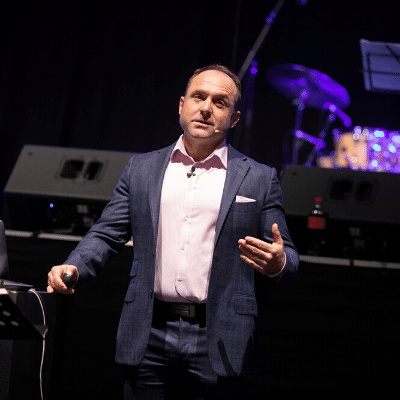
Jonathan Doyle
Jonathan Doyle is an international speaker, author, businessman and executive coach who has spoken around the world to more than 400,000 people on topics related to personal development, peak performance, leadership, Catholic school evangelisation, relationships and much more.
His recent keynote addresses include the NCEA National Convention in St. Louis Missouri to 10,000 delegates and he is a frequent keynote speaker in the US, Asia and Europe.
He is also the founder of an influential education and media business that delivers training content to hundreds of organisations and thousands of individuals around the world on a weekly basis.
Jonathan holds an undergraduate degree in education from the University of Canberra, a Masters Degree in Leadership and Management from the University of Newcastle and has also undertaken post-graduate study in philosophical anthropology.
He is the author of numerous books on relationships and peak performance and each day shares these same ideas with a large global audience via The Daily Podcast with Jonathan Doyle.
Finishing Strong is a loud and clear call for every young person to make the very best of their final years of school. Based on hundreds of seminars around the world to a huge number of students Jonathan Doyle offers powerful, practical advice that can make a major difference.
Each chapter offers inspiring stories, clear principles and actionable steps for identifying and moving forward in study, life, friendships and each key area of life.
Jonathan also includes journal questions and guided reflections at the end of each chapter to maximise learning and ensure the ideas and principles can be made real, personal and achievable.
If you want to help your child or students make the very best of their final years of high school then it;s time to help them finish strong!
10,000 Teachers Have This Book Already!
How can we help teachers avoid burnout, cynicism and exhaustion?
How can the Catholic teacher live their vocation more fully, share the faith with young people and a make a difference in the world?
Over the last two decades, Jonathan Doyle has reached hundreds of thousands of Catholic teachers and leaders around the world with a message of hope and encouragement.
In Tools and Fuels, Jonathan offers a compelling vision of what Catholic schools can be in the 21st century and practical and inspiring strategies about the way each Catholic teacher can play their part in living their vocation, reaching young people and saving the world.
Find out more HERE
TRANSCRIPT
Catholic Daily Nov 26 2020
The Catholic Teacher And Breathing Life Into A Dying Culture
📍 Well, Hey everybody, Jonathan Doyle with you once again for the Catholic teacher daily podcast. Which is pretty daily most of the time, depending on what is happening. Karen, and I still have a tribe of young children. You know, the parents listening. You know that season, when you realize that your job in life, your vocation wasn’t really being a teacher or some other important tasks, your job was being a chauffeur, a professional driver.
We’re riding that season at the moment where, uh, we’re just driving kids everywhere and I’m in the studio. Now I’m going to get out of here in a few minutes. And go and do the next round of pickups. Interesting times people are going to be like, what did you do with your forties? I just drove a lot around the place. Well, welcome aboard.
Good to be with you. I want to share with you a little opening reflection here from the inimitable. Regular listeners know, I love that word. The inimitable Romano Guardini uh, incredible Catholic priest. Who’s a. Who died a while ago, but a brilliant, brilliant Catholic theologian academic, and one of his biggest fans was actually.
Joseph Ratzinger, Pope Benedict 16, Pope emeritus, Benedict 16 and div. If Joseph Ratzinger, Pope Benedict is a fan of your theology and academic work, given the scope and scale of Pope Benedict sixteens work, then you know, you’re onto something. So I have this beautiful little book that a friend suggested to me it’s called.
Meditation’s before mess. So I hope you can find this book. It’s really worth getting yourself a copy. Uh, by Romano Guardini that’s G U a R D I N. I. Meditation’s before mess. So I just, uh, Have this book and I dip into it like a fine bottle of wine once in a while. It’s a sort of book that you need to be sitting quietly in a, in a beautiful place to really access and get the depth of this. But listen to this quote here.
From chapter two from the chapter called silence and the word. He says the word is a thing of mystery. So volatile that it vanishes almost on the lip. Yet, so powerful that it decides fetes and determines the meaning of existence. One more time. The word is the thing of mystery. So volatile that it vanishes almost on the lip.
He had so powerful that it decides fates and determines the meaning. Of existence. I really liked that. Primarily because. When you reflect on what he’s saying. That the spoken word is a very fragile thing. You know, it, it’s not, uh, it disappears the second that it’s been an unstated or aspirated, it’s gone.
But that same capacity has the power to shape the destinies of empires and nations and human I think of how many times that, uh, leaders in human history have, have made a decision in spoken it out loud, and those words set in motion, a train of events. For better or worse in human history. Now why this matters is, do you think it’s a coincidence that Jesus is the word.
Of God, he is the logos that spoke the cosmos into existence. Do you think that is a coincidence? Uh, whether you’re a fan or not, I don’t know, but I’ve been listening to the 13 part series. By Jordan Peterson on the old Testament now. If you haven’t heard it, you can find that on Spotify, YouTube. It’s quite extraordinary. It’s a series of lectures. Some of them go for three hours each.
Uh, but it’s this huge series where he sort of unpacks the psychological and theological impact. Of the old Testament. He makes an amazing point. He said, whether you’re an atheist store. Whatever he says you can’t dismiss the power of this text. And he, the reason I’m mentioning that is because he devotes a lot of time.
To describing how the concept of Jesus is the logos. Speaking order into chaos is one of the most defining concepts in human history. We would say the most defining. So let’s never forget that, uh, the word of God. Both in scripture, but the word of God is also a person. Is the central force, the pivot of all the universe.
Wow. Especially in times like these, when there’s so much happening in the world, right. There’s so much upheaval and uncertainty and people looking for a fixed point. And, uh, we have the logos, we have the word. We have the King of the universe just last week. It was the, uh, the face, the Sunday of Christ, the King of the universe.
We had a great homily from, uh, from the priest at the cathedral here. And he just made the point, you know, the battle’s won. It doesn’t feel like it’s sometimes, and we’re all a bit uncertain, but, uh, let’s not. Forget the power. Of the word and also in our own lives, the spoken word ourselves, we participate.
In the speaking of woods and think about that from the perspective of being a Catholic teacher. The words that you speak over the lives of your student. I mean, how many times have you witnessed as a teacher that a single word of encouragement, a single word that’s spoken at the right time can just move a student forward. Bless them. It can change destinies and futures.
I remember being a teacher. Any years ago, and I heard this really unfortunate. Interaction between another teacher who, uh, for whatever reason, I’m, I’m no one’s judged, but they. They really spoken away to a particular student that was quite devastating. And I just happen to overhear it. As I was doing some work outside of the classroom.
And this student came as very gentle young man and he was in tears. And I remember that day speaking to him and just saying to him, listen, This is not the truth about you. And talking to him for a few minutes and speaking the truth over his life. So my friends never forget for a second. The power and the impact and the influence that you have with the spoken word and the deeper we go into our relationship with Christ. The more that we participate in Christ.
The more that we allow ourselves to be transformed into Christ. Then we will begin to speak as he would have a speak powerful stuffer transformative. Think of how many words we speak in a day or in a classroom. And gosh. Alright. And this isn’t even what I wanted to talk about. What I’m going to talk to you about quickly. I’ll do this quickly.
Uh, I’m reading another great book at the moment. It’s called the decadent society. It’s by Ross. Do it. Who, some of you be familiar with? Ross is a Catholic guy. Uh, a Catholic public intellectual, um, you know, probably up there these days. Maybe with the George Vogle kind of reputation. He writes for the New York times. And, uh, he writes quite brilliantly, but his book, the decadent society is.
Had some huge reviews and it’s a, I just want to share with you something about it very quickly when you hear the word decadent and he makes the point in the introduction that most of us think of the word decadent as head in his stick. Uh, you know, drunkenness or wild parties or extravagant, so flagrant displays of wealth.
And he said, look, it can include those things, but. He said that, uh, there’s a much more important definition and his definition is this. And he says, decadence, this is on page eight of the decadent society says decadence. Deployed usefully refers to. Now I have a listen to this. He says economic stagnation.
Institutional decay. And cultural and intellectual exhaustion. At a high level of material prosperity. And technological development. Sorry, economic stagnation, institutional decay. And cultural and intellectual exhaustion at a high level of material prosperity and technological development. And it’s a very deep book and I really do encourage you to grab a copy.
And work through it, but his point is really important for us. He’s basically saying that as advanced cultures have become wealthy, And they’ve reached a high level of financial, economic and technological advancement. But it’s led to a kind of exhaustion, a cultural artistic. Faith exhaustion. And I think that’s pretty much spot on. I think you’ve yeah.
If you look at a lot of our faith in institutions and politics. And, uh, you know, we’ve had some shocking things happen, like in one of our States is something you’d be familiar that, uh, One of our Cardinals, Cardinal George Pell was imprisoned. And, uh, you know, there was a huge amount of evidence that the police force in the state of Victoria.
Had acted in some extremely curious ways. For example, they’d, uh, They’d organized a, a task force to get information about the Cardinal before they had had a single accusation or complaint. You with me on that. So they actually, the police went looking for witnesses before anybody had ever made a claim bed, anything.
So my point is that what this led to was a kind of an exhaustion and fatigue over institutions that we once would have trusted implicitly police force legal system, the government even. So, what do that’s getting at in this book? Is that we’ve got this kind of cultural exhaustion happening and, uh, you know, I think it’s coming at us from social media. It’s the new cycle. It’s this endless, it’s not one thing. It’s another, so what’s this all got to do with us in Catholic education. I just want to make two quick points. Here’s the first one.
Look. Back at the early centuries of Christianity, very much. The Roman empire was in exactly the same position of cultural and economic exhaustion. It had become the most influential, powerful force in human history, but it ran out of energy. It ran out of puff. It ran out of self-belief. And I think we’re seeing a little bit of that in our culture at the moment, too. And you see in the early centuries of Christianity, reenergizes culture.
You know, look at the Sistine chapel, look at the, the Renaissance, look at the great art and architecture, you know, the, the incredible stuff that defines so much. That’s true. Good and beautiful about Catholicism. Came because of a re energization of culture. You look at a book like a rod Dreher’s Benedict option. Of course.
Where he points to the collapse of the Roman empire and then the rebirth through the monastic tradition with people like Saint Benedict of nurse. Yeah. So I think we’re in a decadent place in the sense of cultural exhaustion and it matters because the first point. Is the Christianity has historically re-energized culture at key moments. Why, why does it happen?
Because Christians realize that this isn’t home. And they live in particular ways and they participate in the divine and they bring the kingdom of God to life. In culture now, often that comes to starkly at the end of great suffering and often cultural collapse. And no one wants to get excited about that. And neither do I.
But let’s not forget. That we are playing a part in this as Catholic educators. A job is to play whatever role we are called to in the re energization of culture. And as I’ve said on stages all over this planet, you cannot give what you do not possess. So we can only give the creativity and insight and imagination that comes to us through the inbreeding of the Holy spirit.
We can only be energized for the long journey ahead. If we have the person of Christ indwelling. So it’s not about a theory or a system or a program. It’s about the incarnation. It’s about the incarnation coming to reality in your life, in your classroom. So I just want to encourage you. I think we’re in a really.
Pretty much historically predictable moment. And it’s probably going to get worse, possibly significantly worse, but we don’t need to circle the wagons. We don’t need to go live in caves. We don’t need to complain and whinge. And take to Twitter. We just need to become saints and to love and to cooperate with the graces of the Holy spirit that’s given to each one of us. And if you’re listening to this at the 12 minute 43, Mark.
Give or take. Because I’ve got to put the music track scene. Then you’re listening to this because God’s placed you in the role of Catholic teacher. He’s made you a Catholic educator. And is this culture, experiences, exhaustion, and fatigue. He wants to re-energize you so you can play whatever part you are called to, to re-energize culture.
So don’t try to do this on your own friends. This will just burn you out and wipe you out and you can’t fix the whole thing, but you can allow Christ to transform you. All right. It’s all I want to say. I know there’s a lot in that, but, uh, I could talk forever on that topic, but let’s finish there.
Let’s trust God and the Holy spirit to sift out the chaff of what I’ve said and leave you with anything that’s useful. So please go check out the website one Catholic teacher.com. I want you to go to the resources page. I want you to take the free trial of the going deeper resource. Go check it out. Free Catholic teacher formation, trial resource, going deeper on the resources page. My books are there. Everything’s there.
Uh, I’m taking bookings again as travel, at least here in Australia at the moment it begins to open up. Now, listen, please make sure you’ve subscribed. Please have subscribed to this podcast for me. Uh, share this with some friends. That’s what I want to say. God bless you. Thanks for everything you’re doing every single 📍 day as a Catholic teacher, my name’s Jonathan Doyle. This has been the Catholic teacher daily podcast.
And I’m going to have another message for you tomorrow.
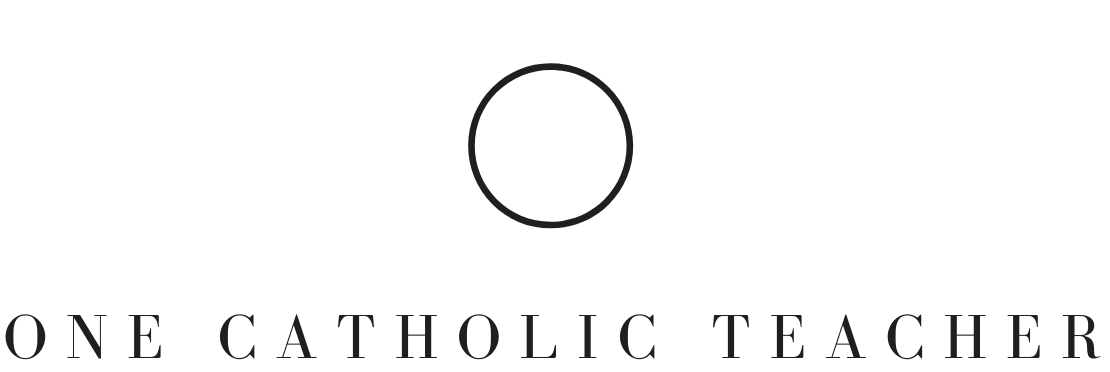



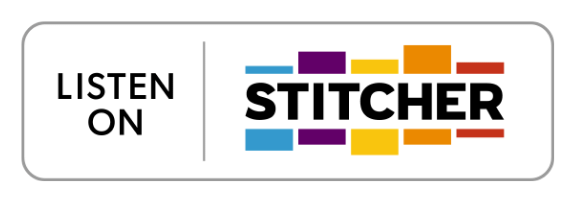
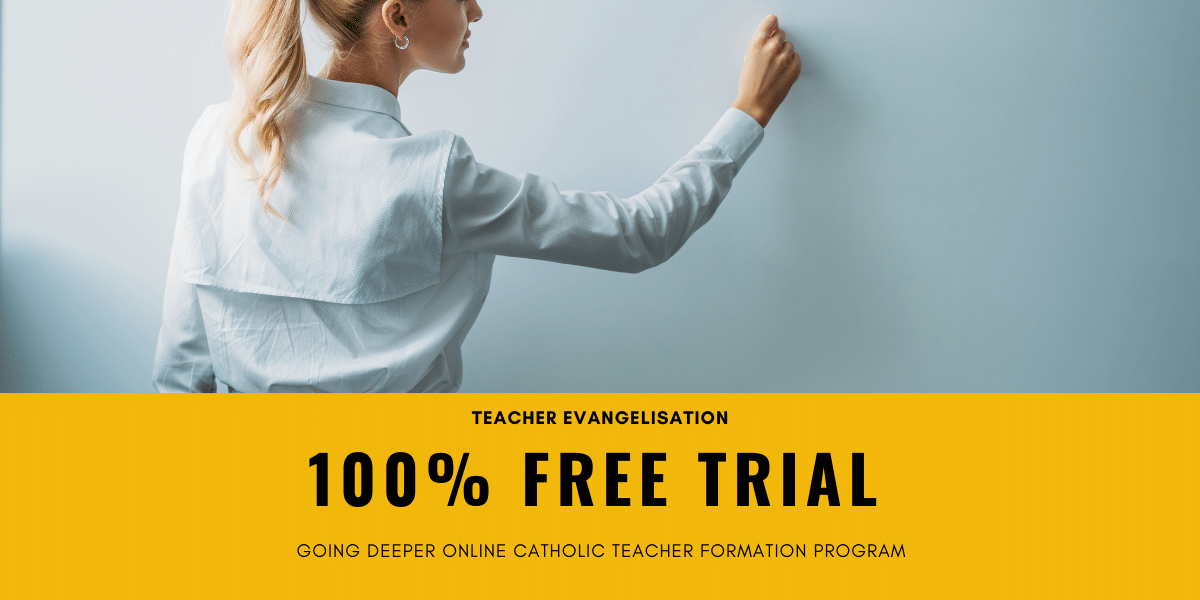
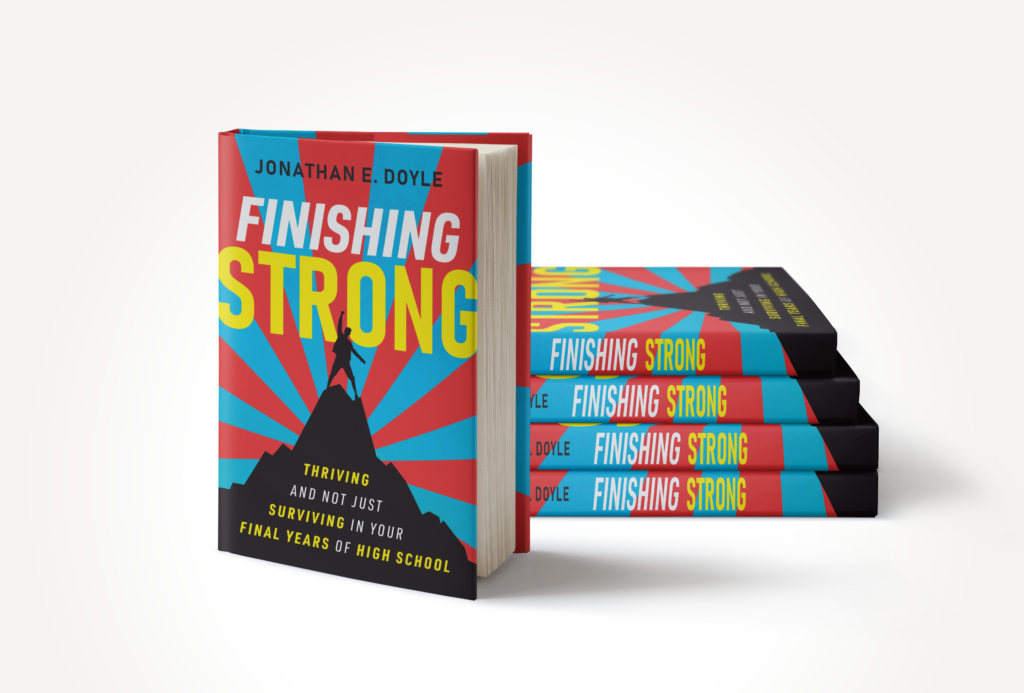
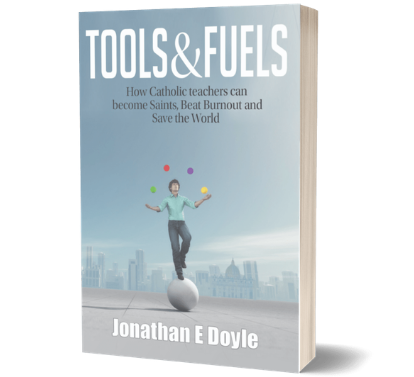




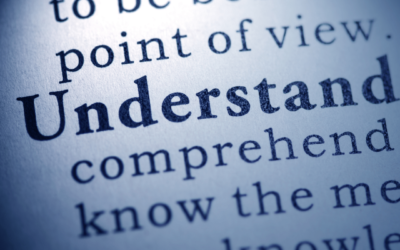

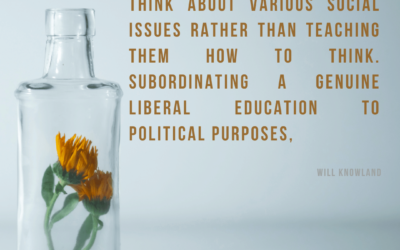


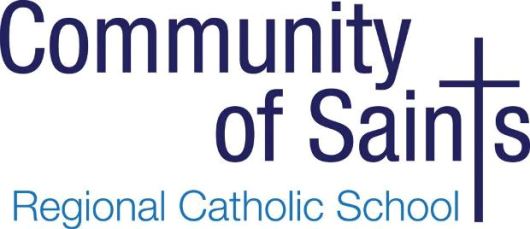

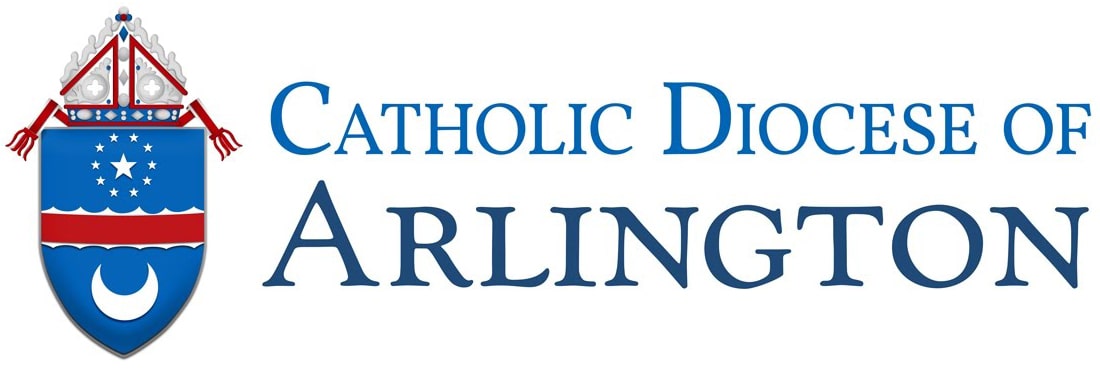
0 Comments